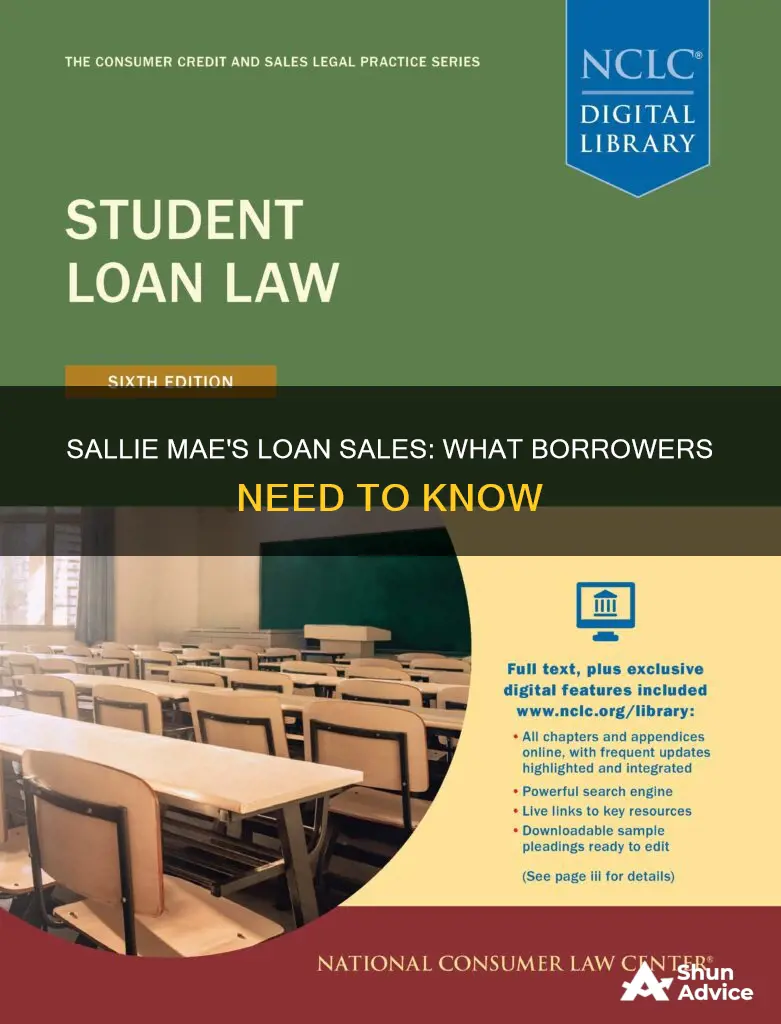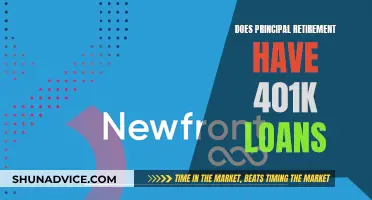
Sallie Mae is a private lender that offers private student loans for a variety of degrees, including undergraduate, MBA, medical school, dental school, and law school. The company has gone through several shifts since its creation in 1972, initially as a government-sponsored enterprise, then as a fully private-sector company in 2004, and most recently in 2014 when it split to form Navient and Sallie Mae. As of 2014, all of Sallie Mae's student loans are private, and its federal loans have been sold to another servicer.
| Characteristics | Values |
|---|---|
| Type of company | Private |
| Type of loans offered | Private student loans |
| Loan coverage | Up to 100% of education costs |
| Loan requirements | Credit-based |
| Loan repayment | Fixed or variable rate options available |
| Loan status | Check studentaid.gov |
What You'll Learn

Sallie Mae's transition from federal to private lender
Sallie Mae is a private lender that offers private student loans for undergraduate, career training, and graduate programs. It also provides parent loans and loans to part-time students. However, this wasn't always the case, as Sallie Mae initially operated as a federal student loan servicer under the Federal Family Education Loan Program (FFELP).
Sallie Mae's transition from federal to private lending occurred in several phases. Firstly, in 2004, the company privatized and began issuing private loans while still offering FFELP loans. This initial phase of privatization marked a significant shift in Sallie Mae's business model, allowing it to enter the private lending market.
The second phase of the transition took place in 2010 when the FFELP program ended. At this point, Sallie Mae stopped originating federal loans but continued to service existing federal loans until 2014. This period served as a transitionary phase, during which the company gradually shifted its focus entirely to private lending.
The final phase of the transition occurred in 2014 when Sallie Mae exited federal loan servicing altogether. The company's federal loan servicing arm was spun off into a separate entity called Navient, which took over the servicing of Sallie Mae's federal loans. Since then, Sallie Mae has exclusively offered private student loans, no longer servicing or originating any federal loans.
This transition from federal to private lending allowed Sallie Mae to pursue its lending approach, emphasizing responsible borrowing and financial literacy. The company encourages students and families to explore alternative sources of funding, such as savings, grants, scholarships, and federal student loans, before considering private loans. By positioning itself as an education solutions company, Sallie Mae aims to empower students and their families to make informed financial decisions regarding their education.
Prosper Loans: Non-Citizens and Permanent Residents Eligibility
You may want to see also

Sallie Mae's loan requirements
Sallie Mae is a private lender that offers private student loans for undergraduate, career training, and graduate programs. The company previously provided federally backed loans through the Federal Family Education Loan Program (FFELP) but transitioned to a private lender in 2004 and stopped offering federal loans in 2010.
Credit Approval and Identity Verification
Sallie Mae requires credit approval and identity verification for all loan applicants. This means that the company will review your credit history, including your borrowing and repayment behaviour, to determine your creditworthiness and ability to repay the loan.
Loan Documents and School Certification
Applicants must provide signed loan documents and ensure their school's certification. This includes submitting basic information such as name, address, and date of birth, along with details about the chosen school.
Citizenship and Residency Requirements
Sallie Mae's loans are subject to specific citizenship and residency requirements. Students who are not US citizens or permanent residents must reside in the US, attend school in the US, and apply with a creditworthy cosigner who is a US citizen or permanent resident.
Minimum Loan Amount
The requested loan amount must be at least $1,000. The APRs advertised for undergraduate students typically assume a $10,000 loan for a four-year programme.
Age Requirement
The student or cosigner must meet the age of majority in their state of residence. This varies by state but is typically 18 or 21 years old.
Interest Rate and Repayment Options
Sallie Mae offers both fixed and variable interest rates. With a fixed rate, the interest remains constant throughout the loan period, resulting in predictable monthly payments. On the other hand, a variable interest rate can fluctuate based on changes to the loan's index, potentially saving money but also increasing the overall cost.
Sallie Mae also provides different repayment options, including the Fixed and Deferred Repayment Options and the Interest Repayment Option. The former typically carries a higher interest rate, and any unpaid interest is added to the loan's current principal at the end of the grace/separation period.
Additionally, borrowers or cosigners can enrol in auto-debit through Sallie Mae to receive a 0.25 percentage point interest rate discount during active repayment. This discount may be suspended during forbearance or deferment.
It is important to note that Sallie Mae's loans are not intended for graduate students. They are designed for undergraduate and career training students, and the student must attend a participating school.
Sallie Mae also emphasizes financial literacy and provides free financial planning tools, scholarship search tools, and consistent communication regarding loan details to help students and their families make informed decisions about their higher education financing.
Purchasing Power: Loans and Employee Benefits
You may want to see also

Sallie Mae's loan repayment options
Sallie Mae is an education solutions company that provides private student loans. It started as a federal government initiative under the Federal Family Education Loan Program (FFELP) but privatized in 2004. All Sallie Mae loans taken out since 2014 are private, and the company no longer services federal loans.
Sallie Mae offers several repayment options for its private student loans. These include:
- Deferred repayment: Make no scheduled loan payments while you’re in school and during your separation or grace period.
- Fixed repayment: Pay a fixed amount every month you're in school and during your separation or grace period.
- Interest repayment: Only pay the interest every month you’re in school and during your separation or grace period.
The Graduated Repayment Period (GRP) lets you make interest-only payments for 12 months after your separation period. The GRP doesn’t extend your loan term, and you can request the program during the 6 months before and the 12 months immediately after you begin principal and interest payments.
Sallie Mae also offers forbearance and loan modification options for customers who are delinquent or struggling to make payments. Forbearance allows you to temporarily postpone your payments, while loan modification lowers your monthly payments by reducing your interest rate and possibly extending your loan term.
You can make Sallie Mae loan payments through auto-debit, online, mobile app, by phone, mail, or third-party bill pay services.
Robinhood's Stock Loan Program: What Investors Need to Know
You may want to see also

Sallie Mae's loan interest rates
Sallie Mae is a private lender that offers private student loans. The company used to provide federally backed loans but has been a private lender since 2010 when the Federal Family Education Loan Program (FFELP) ended.
Sallie Mae offers variable and fixed interest rates for its private student loans. Variable interest rates may increase or decrease over the life of the loan, based on changes to the 30-day Average Secured Overnight Financing Rate (SOFR) rounded up to the nearest one-eighth of one percent. The advertised variable rates are the starting range of rates and may vary outside of that range over the life of the loan.
For a $10,000 Smart Option Student Loan with the most common fixed rate, fixed repayment option, 6-month separation period, and two disbursements, the interest rates are as follows:
- For a borrower with no prior loans and a 4-year in-school period, the interest rate is 10.28% fixed APR.
- For a borrower with $20,000 in prior loans and a 2-year in-school period, the interest rate is 10.78% fixed APR.
It is important to note that interest rates for Sallie Mae loans may be higher compared to variable rates, and the total loan cost may be higher with unpaid interest added during the grace period after school.
Sallie Mae also offers a 0.25 percentage point interest rate discount if the borrower or cosigner enrolls in auto-debit through the company. This benefit applies only during active repayment when the designated amount is successfully withdrawn from the authorized bank account each month.
Quicken Loans: Hard Inquiry or Soft Check?
You may want to see also

Sallie Mae's loan application process
Sallie Mae is an education solutions company that provides private student loans and free college planning resources. It is not a part of the federal government or a federal student loan servicer.
Sallie Mae offers different types of student loans, and the eligibility requirements differ for each loan. Private student loans are credit-based, meaning the lender will check the applicant's credit rating and other information. If the applicant is just entering college, they may not have much credit history, so they may need a creditworthy cosigner. A cosigner shares the responsibility for paying back the loan.
The lender will evaluate the applicant's credit history to determine if they meet the lender's guidelines. The lender will consider factors such as a particular credit score range, outstanding debts, and income.
Students must apply for a new loan each school year. The approval percentage for undergraduate and graduate students with a cosigner in the 2021/22 school year was high, and 95% of students who were approved with a cosigner were approved again when they returned with a cosigner the following year.
After the loan application is submitted and approved, a certification request is sent to the applicant's school. Schools have different processes for certification, and most only certify 30 days before the enrollment period begins. Once certification is received and the right to cancel period has expired, the loan is ready to be disbursed to the school. Loan funds may be divided into multiple disbursements, usually one per semester.
Sallie Mae also provides scholarships to support access and completion for students from underserved communities. They offer free financial planning tools and a scholarship search tool to help students find scholarships based on their skills and interests.
PMI and Rural Development Loans: What You Need to Know
You may want to see also
Frequently asked questions
Yes, Sallie Mae has sold their federal loans to another servicer.
Sallie Mae stopped servicing federal loans in 2014.
Sallie Mae currently offers only private student loans.
Private student loans are credit-based, meaning the lender will check your credit rating and other information.
Sallie Mae is an education solutions company that provides students and families with free college planning resources and private student loans.







